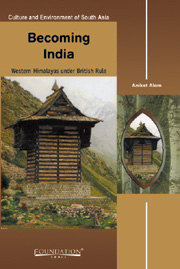Book contents
- Frontmatter
- Contents
- Preface
- Glossary
- Map
- Chapter 1 The Geography of the Western Himalayas
- Chapter 2 Political Economy of the Western Himalayas: Early Nineteenth Century
- Chapter 3 The Foundations of British Rule: Hill State, Hill Station, Land Settlement and Monetisation
- Chapter 4 Peasant Rebellions and Royal Reconciliation: British Rule inside the Hill States
- Chapter 5 Social Movements during British Rule
- Chapter 6 After Independence
- Conclusion
- Bibliography
- Index
Chapter 6 - After Independence
Published online by Cambridge University Press: 26 October 2011
- Frontmatter
- Contents
- Preface
- Glossary
- Map
- Chapter 1 The Geography of the Western Himalayas
- Chapter 2 Political Economy of the Western Himalayas: Early Nineteenth Century
- Chapter 3 The Foundations of British Rule: Hill State, Hill Station, Land Settlement and Monetisation
- Chapter 4 Peasant Rebellions and Royal Reconciliation: British Rule inside the Hill States
- Chapter 5 Social Movements during British Rule
- Chapter 6 After Independence
- Conclusion
- Bibliography
- Index
Summary
On 20 May 1946 the Cabinet Mission published its recommendations, which made it apparent that British rule was soon to end in the Indian subcontinent, even though the exact manner of its end was still intensely disputed. The consequences of these Cabinet Mission proposals were as momentous in the Western Himalayas as in other parts of this vast British colony. As a result of these proposals political activity revived in the Punjab Hill States. Praja Mandals were formed where none existed and older ones were reactivated. More importantly, conflicts within the leadership of these Praja Mandals became apparent and came to the fore in many organisations. This development was directly related to the clash between two different political agendas for guiding the Praja Mandal movement, which were themselves based on divergent class and ideological locations of the contending groups. The immediacy of independence and the possibility of gaining political power in real terms lent a certain bitterness and rancour to these struggles within the Praja Mandals and their umbrella organisation, the Himalayan Hill States' Regional Council.
Right from the beginning of the encounter with British colonialism, the peasantry of the Western Himalayas had attempted to come to terms with these conflicts. During the first few decades, the impact of British presence was relatively marginal and therefore, did not greatly strain the traditional economic and political institutions of the people.
- Type
- Chapter
- Information
- Becoming IndiaWestern Himalayas under British Rule, pp. 254 - 298Publisher: Foundation BooksPrint publication year: 2007



